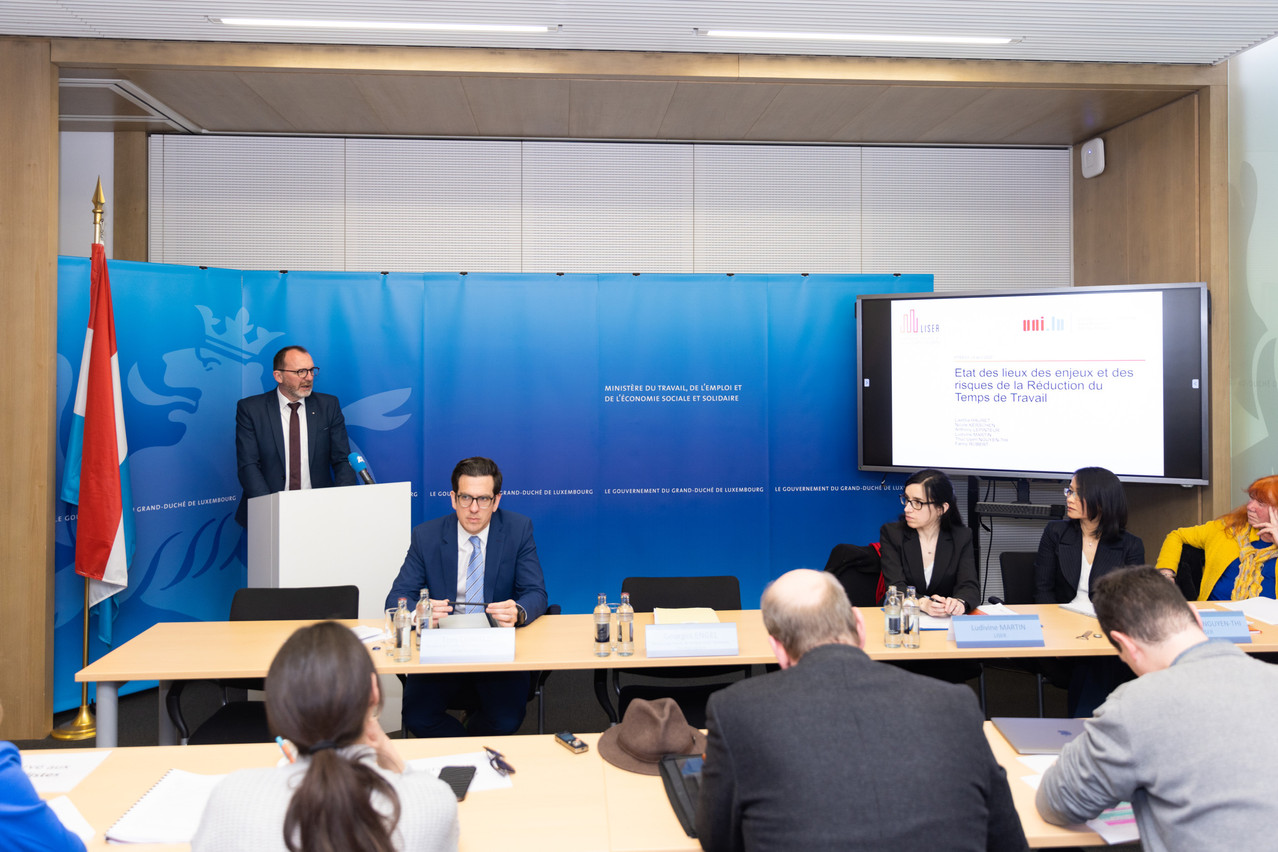A study conducted by the Luxembourg Institute of Socio-Economic Research (Liser) and the University of Luxembourg on “the challenges and risks of a reduction in working time” , will be presented on Thursday to the members of parliament’s labour, employment and social security committee. Among the speakers at the Chamber of Deputies will be Thuc Uyen Nguyen-Thi, researcher in labour and behavioural economics at Liser and coordinator of the study.
Julien Carette: This study does not give a clear-cut view on the implementation of a reduction in working time. So what do you think?
Thuc Uyen Nguyen-Thi: I would first like to point out that for this study, we did not have any data enabling us to anticipate or evaluate the effects of a possible reduction in working time applied in Luxembourg. This was therefore not our aim.
Our aim was rather to contribute to the debate on this subject. We therefore carried out a scientific, objective and neutral study. We based our work on a review of academic articles, scientific evidence and national reports on different working time reductions implemented around the world.
We have shown that an ambiguous effect of the reduction of working time exists in all the areas studied.
To come to your question, we have shown that an ambiguous effect of the reduction of working time exists in all the areas studied. Whether it is in terms of health, wellbeing and the reconciliation of family and professional life for employees. But also in terms of employment and unemployment, or productivity and competitiveness.
What do you mean by “ambiguous”?
Simply that there is no consensus. So the same reform can lead to different results.
How do you explain this “ambiguous effect”?
With several factors, including the economic and social context of the country where the reduction is taking place at the time of the reform, but also the methods of application, the flexibility measures that accompany this reduction or the financing of the latter.
It is also very important to underline that this study shows that the effects of a reduction in working time differ according to the socio-demographic group to which a person belongs, the stage in his or her career path, and the occupation he or she carries out.
It also reveals that such a reform may affect industries and sectors differently, depending on their structure, productivity levels and competitiveness.
Who can be considered the “winners” of such a reform?
In France, in the case of the 35-hour week, for example, it has been more beneficial for women with young children or so-called older workers. This is also the case for employees with a higher level of education. In contrast, people with low wages, those in precarious employment or with little control over their working hours are likely to be forced to hold several jobs to support themselves. This suggests that it would not be easy to find a consensus among employees on the need for such a reduction in working time.

Thuc Uyen Nguyen-Thi, on the right, seen during a press conference with the labour minister, Georges Engel (LSAP), speaking on left, 25 April 2023. Photo: Romain Gamba/Maison Moderne
So a generalised reform, which would be introduced in the same way for everyone, would not be appropriate?
Our study shows that it would be difficult to implement. All the differentiated effects observed, whether at the level of workers, companies, sectors or branches, raise the question of making the reduction in working time more flexible.
They should be taken into account in the debate on a possible reduction in working time in order to determine whether such a reform in Luxembourg should be based on a collective approach or a more flexible approach.
A reform of working time reduction may affect industries and sectors differently, depending on their structure, productivity levels and competitiveness.
So when considering the implementation of a reduction in working time, the basic question to ask is “what is the purpose”?
Several questions should be asked in the current debate on working time reduction. Such as the extent of the reduction--38 hours of work per week? 35 hours?--but also the methods of application, the framework for overtime, financing, etc. The objectives sought through the reduction should obviously also be included.
Establishing a clear purpose for a reform would make it possible to know what we want to achieve. Do we want a reduction to promote employment and reduce unemployment, as was the case in France in 1998 with the 35-hour week? Or do we want to work towards improving the wellbeing, health and reconciliation of workers, as was the case in Portugal, Sweden and Iceland? Or are we looking for growth and competitiveness?
Read also
In terms of financing, are there several possible schools of thought?
There are different ways, yes. The cost can be borne by employees, through a reduction in wages or a freeze on wages. This can have negative consequences on inequalities and social cohesion... It can also be financed by companies, with consequences on productivity and competitiveness.
Another option would be to have the reform financed by the state, by granting financial compensation to companies. Portugal did not do this, for example, when it reformed in 1996. This is in contrast to France, where a reduction in social contributions was introduced. This question of financing is really central when considering such a reform. In Luxembourg, no one has yet come forward on the subject...
Such a reform must be accompanied by complementary flexibility measures.
As work is organised within companies, the latter and above all the managerial policy conducted within each of them are crucial to the success of a reduction in working time.
Such a reform must be accompanied by complementary flexibility measures. These allow companies to adapt and modulate the working time of their employees over all or part of the year. In France, the 35-hour week was accompanied by measures such as the annualisation of working hours, individualisation of working hours, free choice of weekly working hours by companies, etc. Similarly, in Germany, sectoral reductions in working time offered companies more flexibility in organising working time.
The experiences studied have shown that these arrangements have enabled firms to maintain their production levels despite the loss of hours worked. However, it has also been shown that the flexibility granted to companies can have negative consequences for employees, such as unpredictable, atypical working hours or a loss of autonomy in the organisation of their working time. These consequences can obviously be detrimental to their health, but also to their wellbeing and to the reconciliation of family and professional life. This is why managerial policy as well as these flexibility measures are crucial and must be part of the debate between all partners involved.
Read the original French version of this interview on the site



